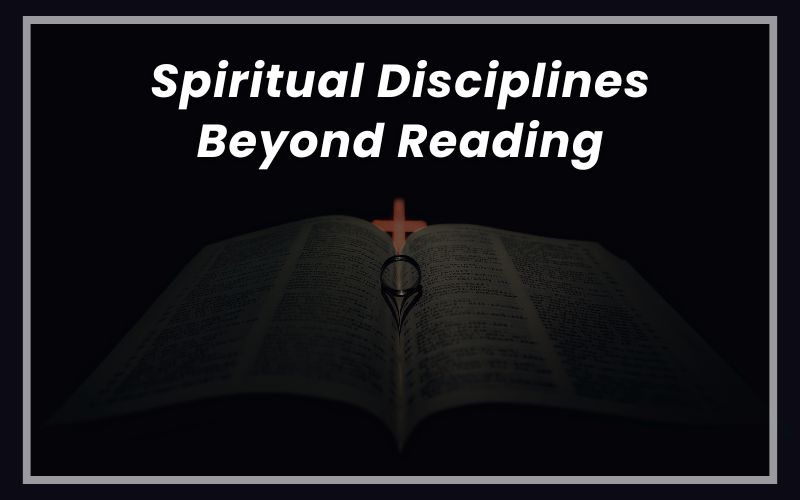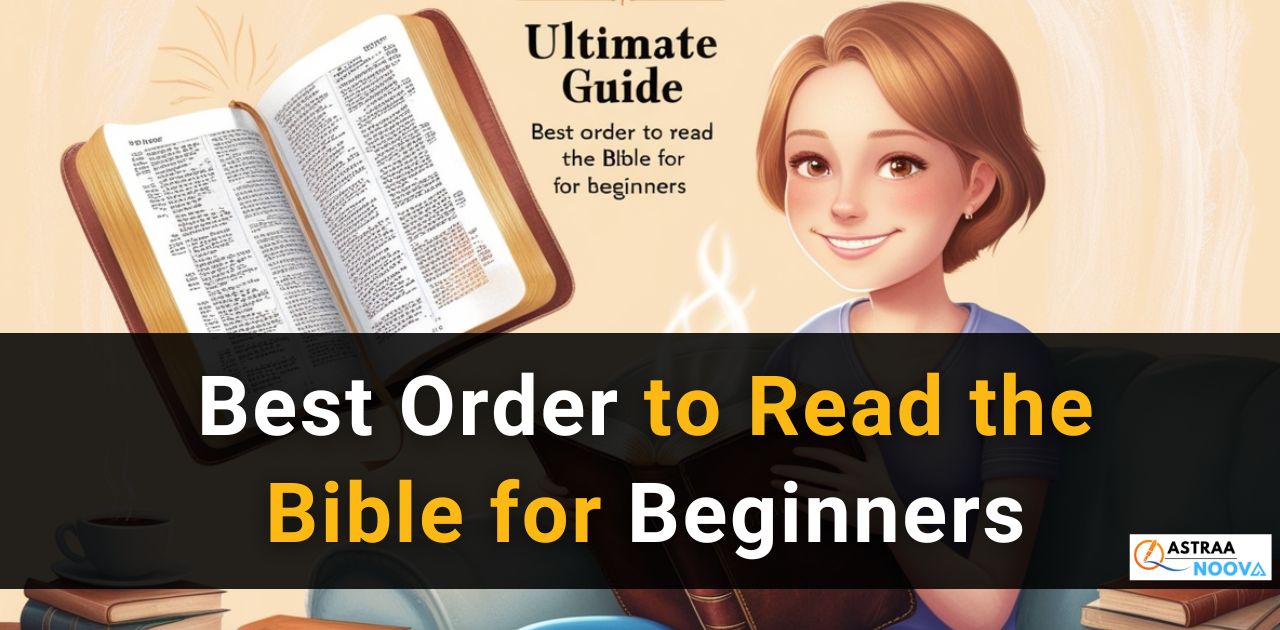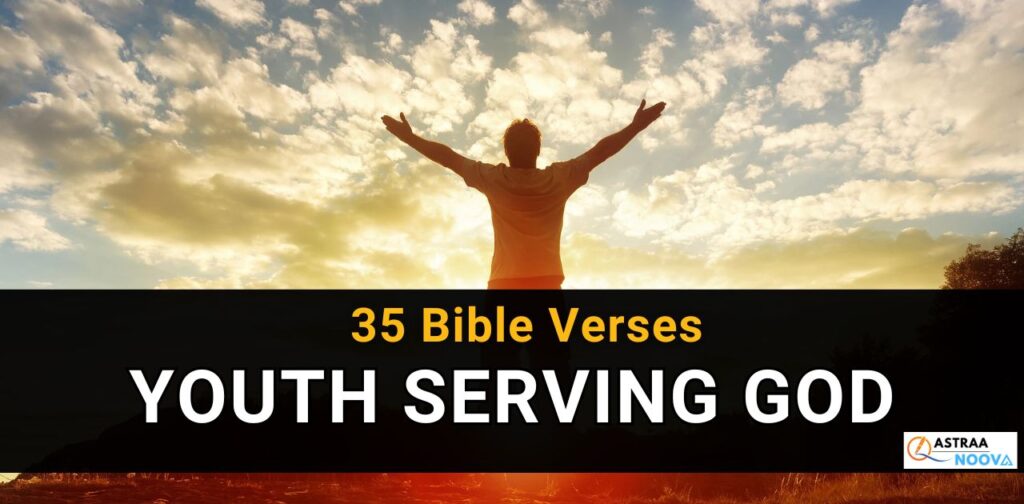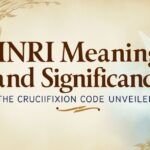Embarking on a Bible reading journey can feel overwhelming, especially for those new to spiritual exploration. Many individuals feel uncertain about where to start, what approach to take, and how to comprehend the profound wisdom contained within these ancient texts.
This comprehensive guide is designed to demystify the process, offering clear, actionable strategies for beginners eager to understand the scriptures and deepen their spiritual foundation.
Whether you’re seeking personal growth, theological understanding, or spiritual enlightenment, navigating the Bible’s complex landscape requires a thoughtful, structured approach.
This guide will provide you with practical insights, recommended reading paths, and proven strategies to make your biblical exploration meaningful and transformative.
Who Is This Guide For?
This ultimate guide is meticulously crafted for:
- First-time Bible readers [Beginners]
- Individuals seeking spiritual growth
- Christians wanting to understand scripture systematically
- Newcomers to Christian theological studies
- Those curious about biblical teachings and narratives
Navigating This Comprehensive Resource
Throughout this guide, we’ll explore:
- Strategic reading approaches
- Recommended starting points
- Understanding different biblical sections
- Practical reading plans
- Spiritual development techniques
Let’s dive into your transformative biblical reading journey.
Should You Read the Bible in Order?

Reading the Bible from cover to cover might seem like the most logical approach, but biblical scholars and spiritual mentors often recommend a more nuanced strategy.
The Bible is a complex collection of texts written by multiple authors across different historical periods, making a strictly chronological read-through challenging for beginners.
The sacred text comprises 66 books spanning historical narratives, poetry, prophecy, letters, and gospels. Each section offers unique insights into God’s relationship with humanity. While some readers find value in a sequential approach, others benefit from a more strategic exploration that focuses on understanding core spiritual messages and teachings.
Many experienced biblical readers suggest starting with sections that provide clearer narrative context and spiritual foundations.
John 1:1: “In the beginning was the Word, and the Word was with God, and the Word was God.”
The New Testament, particularly the Gospels, offers an accessible entry point for those new to scripture. These books provide a direct introduction to Jesus Christ’s life, teachings, and the fundamental principles of Christian faith.
Key Considerations for Biblical Reading
Understanding the Bible requires more than simply reading words on a page. Successful biblical exploration involves approaching the text with an open heart, a curious mind, and a willingness to engage deeply with spiritual concepts. Context matters significantly historical, cultural, and theological backgrounds can profoundly impact one’s understanding of biblical passages.
Spiritual growth is not about completing a reading marathon, but about meaningful reflection and personal transformation. Some readers find it helpful to use study guides, attend group discussions, or consult theological commentaries to enhance their comprehension and connect scriptural teachings to contemporary life experiences.
What is the Best Order to Read the Bible in a Year?
Committing to read the entire Bible within a year is an ambitious yet rewarding spiritual discipline. Several structured reading plans can help practitioners achieve this goal while maintaining engagement and understanding.
The Chronological Bible Reading Plan presents scriptures in the order they historically occurred, offering a unique perspective on biblical narrative progression.
This approach allows readers to trace God’s interactions with humanity through a linear timeline, providing deeper insights into how divine plans unfold across generations.
2 Timothy 3:16-17: “All Scripture is God-breathed and is useful for teaching, rebuking, correcting and training in righteousness, so that the servant of God may be thoroughly equipped for every good work.”
Another popular method is the Bible-in-a-Year Reading Plan, which systematically breaks down biblical texts into daily readings.
This strategy ensures comprehensive coverage while making the extensive text more manageable. Readers can choose from various formats, including plans that balance Old and New Testament readings or focus on thematic explorations.
For those seeking a more personalized approach, thematic reading plans offer flexibility. These plans organize biblical passages around specific themes like love, forgiveness, leadership, or personal growth. Such targeted exploration can make scriptural study more relevant and immediately applicable to individual life experiences.
Practical Tips for Consistent Bible Reading
Establishing a consistent reading routine requires discipline and intentionality. Consider setting aside a specific time each day dedicated to scripture study. Morning hours can provide a reflective start, while evening readings might offer moments of quiet contemplation after a busy day.
Technology can be a valuable ally in maintaining reading consistency. Numerous mobile applications and online platforms offer structured reading plans, daily devotionals, and interactive study tools. These resources can help track progress, provide contextual insights, and maintain motivation during your spiritual journey.
What Order to Read the Bible for Beginners

Navigating the Bible for the first time requires a strategic approach that balances accessibility with spiritual depth. Most theological experts recommend beginning with the New Testament, specifically the Gospels, as these books provide the most direct introduction to Jesus Christ’s life and teachings.
The Gospel of John emerges as an exceptional starting point for beginners. Its profound opening verse:
“In the beginning was the Word, and the Word was with God, and the Word was God”
Offers a powerful theological foundation that immediately connects readers to the divine narrative. This gospel provides a unique perspective, emphasizing Jesus’ spiritual significance and divine nature more deeply than other biblical accounts.
The Gospel of Mark presents another excellent entry point for new readers. Its narrative style is concise and straightforward, offering a clear, action-oriented account of Jesus’ ministry. For individuals seeking a direct, unembellished introduction to Christ’s teachings, Mark provides an ideal starting framework.
Understanding Biblical Context
Comprehending the Bible requires more than sequential reading. Spiritual growth emerges from understanding the historical, cultural, and theological contexts surrounding biblical texts. Contextual awareness transforms reading from a passive experience into an active journey of spiritual discovery.
Early Christian teachings found in the Epistles offer practical guidance for applying biblical principles in daily life. These letters, written to early Christian communities, bridge theological concepts with real-world spiritual application. They provide insights into how first-century believers interpreted and implemented Jesus’ teachings.
Recommended Reading Progression
A suggested reading progression might look like this: Begin with the Gospel of John, then explore the Gospel of Mark. Follow these with the Epistles, particularly those written by Paul, which offer deeper theological insights and practical spiritual guidance. After establishing a foundation in the New Testament, gradually introduce Old Testament narratives to understand the broader biblical narrative.
Read Also >> What Race of Jesus? Was Jesus Black, White, or Middle Eastern?
Choosing the Right Bible Translation

Selecting an appropriate Bible translation significantly impacts spiritual understanding. Different translations offer varying levels of linguistic accuracy and readability. For beginners, contemporary translations like the New International Version (NIV) or the English Standard Version (ESV) provide a balance between scholarly accuracy and accessible language.
Spiritual Tools and Resources
Modern technology offers numerous resources to support biblical study. Digital platforms provide reading plans, contextual commentaries, and interactive study tools. These resources can transform biblical reading from a solitary activity into an engaging, supportive learning experience.
Developing a Consistent Reading Practice
Spiritual growth requires consistent engagement. Establishing a dedicated daily reading time creates a sacred rhythm of reflection and learning. Whether morning or evening, finding a consistent moment helps transform biblical reading from an occasional activity to a meaningful spiritual discipline.
Practical strategies include:
- Setting a specific time each day for reading
- Using reading plans that provide structured guidance
- Journaling reflections and personal insights
- Participating in group study or discussion communities
Psalm 119:105: “Your word is a lamp for my feet, a light on my path.”
Overcoming Common Challenges
Many beginners feel intimidated by the Bible’s complexity. Recognizing that spiritual understanding develops gradually can alleviate initial frustration. Approach scripture with curiosity, humility, and openness to personal transformation.
Spiritual Reflection and Personal Growth
Biblical reading transcends mere intellectual exercise. It represents a journey of personal spiritual discovery, inviting readers to explore deeper questions of meaning, purpose, and divine connection. Each passage offers an opportunity for self-reflection and spiritual growth.
The biblical narrative is not a linear instruction manual but a complex tapestry of human experience, divine intervention, and spiritual evolution. Embracing this complexity allows readers to engage with scripture as a living, transformative text.
Hebrews 4:12: “For the word of God is alive and active. Sharper than any double-edged sword, it penetrates even to dividing soul and spirit, joints and marrow; it judges the thoughts and attitudes of the heart.”
Practical Bible Study Methods for Deeper Understanding
Developing a meaningful Bible study approach requires more than passive reading. Successful spiritual exploration involves intentional engagement, critical reflection, and an openness to transformative insights.
Effective study methods bridge the gap between textual comprehension and personal spiritual growth.
Contextual Analysis Techniques
Understanding biblical passages demands more than surface-level reading. Historical and cultural context provides critical insights into the original meaning of scriptural texts. Scholars recommend examining the socio-economic, political, and religious environments in which biblical texts were written.
Consider the historical backdrop of the early Christian church. The Epistles, for instance, were not abstract theological treatises but practical letters addressing specific challenges faced by emerging Christian communities. By understanding the original context, readers can extract more nuanced and relevant spiritual insights.
Interpretative Approaches
Biblical interpretation is a sophisticated discipline that requires multiple perspectives. Hermeneutical methods include:
Theological interpretation focuses on understanding divine revelations and spiritual principles. Scholarly hermeneutics examines linguistic nuances, historical contexts, and theological implications of biblical texts.
Comparative analysis allows readers to explore how different biblical passages interconnect. Tracing theological themes across various books reveals the comprehensive narrative of divine interaction with humanity.
Navigating Challenging Biblical Passages
Complex biblical texts can be intimidating for new readers. Difficult passages often require patience, scholarly resources, and a willingness to sit with theological complexity.
Recommended Study Resources
Modern biblical scholarship offers numerous tools to support comprehensive understanding:
Scholarly commentaries provide expert insights into historical contexts, linguistic subtleties, and theological interpretations. These resources bridge academic research with spiritual exploration, offering depth beyond casual reading.
Study Bibles combine scriptural text with extensive annotations, historical background, and interpretative notes. These comprehensive volumes transform reading into a rich, multidimensional learning experience.
Spiritual Disciplines Beyond Reading

Biblical engagement extends beyond textual consumption. Transformative spiritual growth involves:
Contemplative practices like meditation, reflection, and prayer complement scriptural study. These disciplines allow personal internalization of biblical teachings, moving beyond intellectual understanding to spiritual transformation.
Proverbs 3:5-6: “Trust in the Lord with all your heart and lean not on your own understanding; in all your ways submit to him, and he will make your paths straight.”
Connecting Scripture to Personal Life
The ultimate goal of biblical study is not academic knowledge but personal spiritual development. Readers are invited to see scripture as a living text that speaks directly to contemporary human experiences.
Maintaining Spiritual Momentum
Consistency proves crucial in spiritual disciplines. Developing a sustainable reading and reflection practice requires:
- Realistic goal setting
- Flexibility in approach
- Self-compassion during challenging periods
- Community support through study groups or mentorship
Addressing Common Challenges in Bible Reading
Spiritual journeys are rarely straightforward, and Bible reading presents unique challenges for many individuals. Understanding and anticipating these obstacles can transform potential frustration into meaningful personal growth.
Psychological Barriers to Scripture Study
Many beginners experience intimidation when approaching biblical texts. The extensive historical narrative, complex theological concepts, and archaic language can feel overwhelming. Recognizing these challenges is the first step toward developing a sustainable reading practice.
Feelings of confusion are normal and should not discourage spiritual exploration. Biblical understanding develops gradually, requiring patience and consistent engagement. Experienced spiritual mentors emphasize that comprehension comes through persistent, thoughtful reflection rather than immediate mastery.
Language and Comprehension Challenges
Different Bible translations offer varying levels of readability. Modern translations like the New International Version (NIV) or the English Standard Version (ESV) provide more accessible language compared to traditional King James translations. Selecting a translation that resonates with your linguistic comfort level can significantly enhance comprehension.
Final Words
Embarking on a biblical reading journey can feel overwhelming, but this guide simplifies the process.
For beginners, starting with the New Testament, particularly the Gospels of John and Mark, provides an accessible entry point. These books offer clear insights into Jesus Christ’s teachings and early Christian principles.
By understanding the context, exploring different reading approaches, and maintaining consistent study habits, individuals can transform biblical reading from a challenging task to a meaningful spiritual experience.
The key is patience, openness, and a willingness to engage deeply with scriptural wisdom, allowing personal growth and spiritual understanding to develop naturally.
Read Also >> Who Saw God Physically in the Bible? 8 Amazing Stories
FAQ’s
What order should I read the Bible in as a beginner?
Begin with the New Testament, focusing first on the Gospels of John and Mark, then explore the Epistles for practical spiritual guidance.
How should a beginner start studying the Bible?
Start with a modern translation like NIV, use a structured reading plan, set consistent study times, and join a study group for support.
What version of the Bible should a beginner start with?
New International Version (NIV) or English Standard Version (ESV) offer clear, accessible language for new readers.
What is the correct way to read the Bible?
There’s no single “correct” way. Approach with an open mind, use study guides, reflect on passages, and connect teachings to personal life.
Where do you start when reading the Bible for the first time?
The Gospel of John provides an excellent starting point, offering a clear introduction to Jesus’ life and core Christian teachings.
What book of the Bible should I read to get closer to God?
The Gospels (John, Mark) and Psalms offer profound spiritual insights and help develop a deeper understanding of divine connection.
Which gospel should a beginner read first?
The Gospel of John is recommended for its accessible narrative and deep spiritual significance, making it ideal for first-time readers.

Multilingual faith educator exploring connections between language, spirituality, and dream symbolism.


















